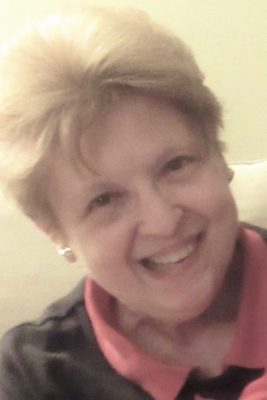I Have a Voice
by Sandra Moss
“I’m sorry. The thyroid cancer was wrapped around your vocal cords. We had to scrape them. You may never speak again.”
Never speak again? I’m only 19. I haven’t even been heard yet!
Thus began my 53-year-long cancer journey. But heard I would be! My voice did return, and I used it on behalf of abused children, infants born with AIDS, homeless teens, and countless others.
The next year, the cancer metastasized to the lymph nodes on the left side of my neck, requiring a radical neck dissection that resulted in scars and disfigurement. Not easy to accept when you are 20 years old.
After marriage and divorce, and with two young children at home, I have to admit my education and career did not follow the traditional path. Working my way through college, I earned my bachelor’s and then my master’s degree. What kept me going was my mantra: I have a voice; I must be heard. I have a voice; I must be heard.
At age 47, I married Bill. He was a kind and generous soul who helped me achieve my dream of attending law school so I could combine a law degree with my social work training and experience for even greater impact. I graduated law school and passed the bar exam at age 50. I was appointed Deputy Attorney General of the state of New Jersey, representing the then Division of Youth and Family Services. Sadly, Bill passed away shortly after my graduation. But he left me with the lasting gift of a law degree to aid me in my fight for abused and neglected children.
It was not the cancer that upended me. Rather, I feared that the side effects would never get better and I would never have my quality of life back.
Depressing? Yes. Gut wrenching? Also yes. Frustrating? Of course. But always, my mantra: I have a voice; I must be heard. I have a voice; I must be heard.
In 2012, I was diagnosed with breast cancer, HER2 positive. After everything I had been through, I thought, Well, I could certainly live without one breast. If only that was all there was to it.
The chemo, the scan anxiety, the juggling appointments, the fatigue, the brain fog, the realization of how aggressive the HER2 protein can make the cancer … so much I was not prepared for. But, still, I have a voice; I must be heard. I have a voice; I must be heard.
In 2017, the cancer metastasized to my lungs. These metastases were held at bay for two years by chemotherapy and targeted therapies. Life went on. I knew what to expect and how to cope.
Then, in 2019, a brain metastasis. Now, we were talking serious stuff. Removing my breast was one thing, but operating on my brain was another. Fortunately, gamma knife surgery has been successful in keeping the tumor from metastasizing.
In late 2020, the cumulative effects of almost four years of chemotherapy and intermittent brain swelling resulted in double vision, severe headaches, gait and balance issues, and painful neuropathy. My neurologist told me to stop driving. My oncologist stopped chemotherapy and sent me to a palliative care specialist. I felt like I had been written off. That there was no hope for improvement.
What kept me going was my mantra: I have a voice; I must be heard. I have a voice; I must be heard.
It was not the cancer that upended me. Rather, I feared that the side effects would never get better and I would never have my quality of life back. I no longer felt like I had a voice or anything to say worth hearing. I no longer committed to anything long term. I was ruled by the what if. What if this happens or that happens, and I am not able to do it?
Then, I found a breast cancer support group. In this group of stunning women, I am surrounded by enthusiasm, positivity, and selflessness. Because of these women, I no longer live by the what if. I have found my voice again.
Yes, I have a voice. And I want to use it to encourage everyone living with metastatic breast cancer to live in the moment, forget the statistics, anticipate abundant blessings, learn from each other, and most of all, have hope.

Sandra Moss, 72, attributes her comeback from a period of hopelessness to a support group for people with metastatic breast cancer. She knows how retirement, pandemic isolation, age, and other factors can affect mental health and physical recovery, so she encourages others to reach out and connect.
Visit our Cancer Survivors Guide to find support groups and other resources.
This article was published in Coping® with Cancer magazine, March/April 2022.
Everyone has a unique story to share. Do you want to share your survivor story?
We consider a cancer survivor to be anyone living with a history of cancer –
from diagnosis through the remainder of life.
Here are our submission guidelines.


